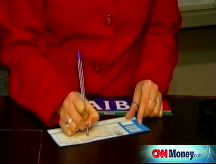Waterford Wedgwood files for bankruptcy
The British glassmaker filed for bankruptcy protection after it was unable to pay off its debt.
LONDON, England (CNN) -- Fine china and glasswork maker Waterford Wedgwood PLC has called in a receiver - the British equivalent of bankruptcy.
The company said its receiver will be the international accounting firm Deloitte, and added it will announce later Monday which of its Irish and U.K. subsidiaries will be put into administration.
The announcement was made in a statement Monday morning to the London Stock Exchange.
Receivership and administration are forms of bankruptcy protection. The administrator can choose to try and keep parts of the company operating or sell off the brands, shutting down the company. The aim is to find the most profitable way to pay creditors.
Waterford Wedgwood can trace its roots back to the 18th century, when glass blown in the Irish port of Waterford became a popular export and Josiah Wedgwood began to make affordable fine china in the British midlands.
The two well-known brands merged in 1986, but had suffered losses in each of the past three years. Waterford has been laying off employees in southeast Ireland since 2007, having moved much of its production to Slovenia. The company also has a ceramics plant in Jakarta, Indonesia. The group also includes the brands' Royal Doulton and Rosenthal porcelain.
In December the company announced it could no longer pay its debt obligations to a consortium of lenders, headed by Bank of America. (BAC, Fortune 500) Waterford Wedgwood was given two periods of 'forbearance' in December by the banks, giving it more time to find a buyer or a cash injection. That grace period ended on Monday.
Waterford Wedgwood is controlled by well-known Irish aristocrat Tony O'Reilly. In the company's announcement to the London Stock Exchange, O'Reilly said "We are consoled only by the fact that everything that could have been done, by management, and by the board, to preserve the Group, was done."
The company says its main markets are the United States, Britain and Germany, with a growing exposure in Asia and Eastern Europe. ![]()


